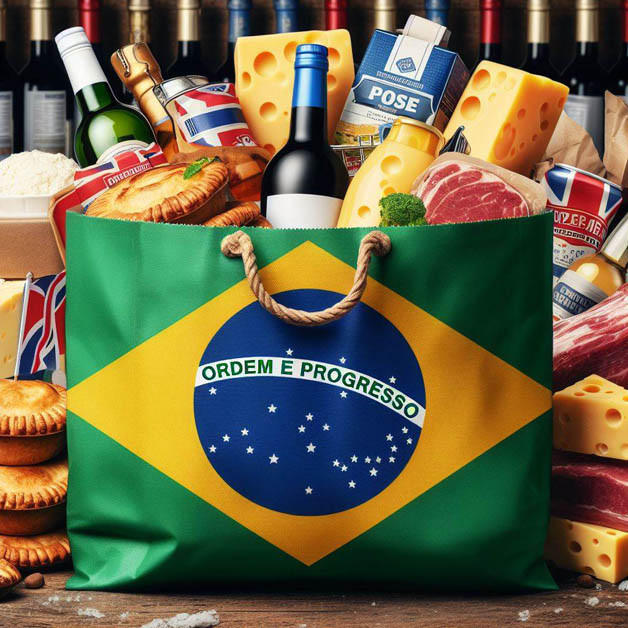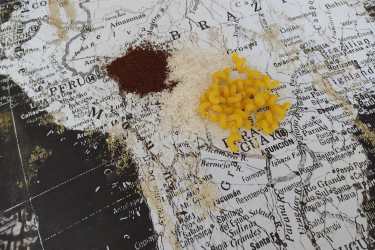With the UK still looking to establish its global trade position post-Brexit, many producers and suppliers and buyers are seeking fresh opportunities in previously under-visited markets. Following on from our look at opportunities in Japan, our agri-food consultant Edwin Reyes assesses the potential for exporting food to Brazil.
Brazil – economy and demographics
Brazil is considered South America’s most influential country. It is a rising economic power and one of the world’s biggest democracies. According the the Brazilian census of 2022 population in 2022 was 203 million people, representing an increase from 6.5% since the previous count in 2010.
Population
203 million
Age structure
0-14 years: 20% (approx.)
15-64 years: 70% (approx.)
65 years: 10% (approx.)
Median age: 35.7 years
Source: https://www.cia.gov/the-world-factbook/countries/brazil/
GDP (2023)
£1.71trillion.
Estimated to increase to £1.98 trillion by 2026 (which would rank the country as the eighth largest economy in the world).
Source: https://www.imf.org/external/datamapper/NGDPD@WEO/BRA
Household income
14% of households have an income above £43,500 per annum.
UK-Brazil trade
The UK’s 29th largest trading partner (0.6% of total UK trade)
Total trade in goods and services £10.4 billion
UK exports to Brazil: £5.6 billion (up 36.1% compared to previous four quarters)
UK imports from Brazil: £4.8 billion (up 20% compared to previous four quarters)
Market share for UK goods in Brazil: 1.1%
(Note: All figures are for period Q3 2022 to Q3 2023)
A lot of Brazilian export to the UK is food-based
According to UK government figures, a high proportion of Brazilian exports to the UK are food, beverages and tobacco. Here are the top five:
- Beverages & tobacco (£535.7 million or 15.4% of all UK goods imported from Brazil)
- Mechanical power generators (intermediate) (£352.1 million or 10.1%)
- Meat & meat preparations (£324.0 million or 9.3%)
- Oil-seeds & oleaginous fruits (£319.2 million or 9.2%)
- Vegetables & fruit (£202.7 million or 5.8%)
(All figures Q3 2022 to Q3 2023)
Meanwhile, the UK does not currently export much food to Brazil. Our export is dominated by medicines, industrial machinery, cars, and organic chemicals.
The top five goods exported by the UK to Brazil in the four quarters to the end of Q3 2023 were:
- Medicinal & pharmaceutical products (£334.1 million or 11.8% of all UK goods exported to Brazil)
- Mechanical power generators (intermediate) (£307.8 million or 10.8%)
- Cars (£197.8 million or 7.0%)
- General industrial machinery (intermediate) (£164.7 million or 5.8%)
- Organic chemicals (£161.6 million or 5.7%)
(All figures Q3 2022 to Q3 2023)
In fact, the UK currently exports more “residues, wastes of food industry, animal fodder” to Brazil (worth £9.8m in 2023) than any other foods.
Ultimately, based on data from the Food & Drink Federation, Brazil does not even feature in our top 20 food export markets. In short, our producers and exporters are missing an opportunity.
The rest of the world is already exporting food to Brazil
Despite macro issues such as exchange-rate volatility, Brazil has maintained its position as a major importer of agricultural products from the world. It is the largest importer in South America, which suggests that there are opportunities for UK exporters.
In 2022, Brazil’s imports of consumer-oriented food products amounted to £4.1 billion. 30% of this came from the EU, which was a 20% increase on the 2021 figure.
Based on data of goods imported into Brazil, there are items that certainly should be on British producers’ radars. These include dairy products, food ingredients, spirits, condiments and sauces, confectionery, bakery goods, cereal-based products and seafood.
85% of the food consumed in Brazil also undergoes some sort of industrial process, representing a further potential opportunity for UK agri-tech and food processing technologies.
It’s competitive!
The Brazilian food industry is well developed, and the presence of major multinational companies (notably Carrefour) makes the sector very competitive. Some products from the likes of the EU and US products cannot compete with domestically produced goods or Mercosur-origin products. This is mainly due to price, exacerbated by exchange rates and import tariffs.
Consequently, when a product imported from a non-Mercosur member reaches the Brazilian market, it will most likely be positioned as a premium product. You should take this into account if considering a product for export.
However, this can become a positive: Brazilians perceive European food and drink products as high quality and consider them to have been produced to exacting standards. To establish your product in this sector, you should always emphasise its impeccable provenance and associated heritage.
Brazilian retail sector characteristics
Brazil’s retail sector, with a revenue of £106.7 billion in 2022, is the most important channel in the food distribution system. The industry is well-integrated, dynamic, and sophisticated.
Overall, though, distribution is still quite fragmented. It includes various food retailing formats, such as neighbourhood stores, supermarkets, hypermarkets, cash-and-carries, and in more recent years, the development of the e-commerce route to market.
To illustrate the fragmented nature of the Brazilian market, the French-owned Carrefour is by far the single biggest retailer in Brazil, but still only has a share of 15%.
The food-service sector is also an important industry. In 2022, sales via this channel were worth about £83.9 billion. These figures reflect a recovery post-COVID-19 that is expected to continue throughout 2024.
Barriers and opportunities to exporting food to Brazil
As always, when there are efforts to develop and grow trade partnerships with large food-economy countries, the main areas of discussion are around how the local industry could be negatively affected. As in the UK, there is a debate about this in Brazil. Sometimes, this can cloud the significant opportunities that these markets represent for producers that are willing to put the hard work in to gain export success. This is certainly the case for UK exports to Brazil.
In Brazil, the UK’s food industry is seen as sophisticated and robust, one that is strong enough to compete in any market. This suggests that Brazilian consumers would welcome our products, particularly at the high end.
For advocates of British export, future engagement with large, expanding and under-explored markets such as Brazil, would be seen as positive. This especially at a time when the UK government strategy is to open new markets in regions such as Oceania, Asia, and Latin America.
Routes to success
To succeed in the Brazilian market, apart from building relationships with key partners, identifying the most efficient ways to access the market is vital.
As with any market, a prospective exporter needs to develop a mid- to long-term view of the potential to sell into Brazil. It is not a short-term proposition or a market for the speculative “in and outer”. The size of the prize for those that treat Brazil as a dedicated export market is clear to see.
Top tips for prospective exporters to Brazil
- Research the Market – Brazil is not the easiest market to enter and success will rely on patience and your willingness to research the market thoroughly.
- Understand the consumer – Brazil is a one of the world’s biggest economies, and it is growing. Furthermore, Brazilians’ appetite for UK food and drink products is growing. A great way to understand the consumer is to visit and experience the country. It will help you to develop a sense of the viability of your product. You will also notice opportunities that you may not have previously considered.
- Meet buyers, and build relationships – In Brazil, a lot of importance is put on personal contact. You may need to visit several times before securing a deal.
- Understand regulatory challenges – Brazil has a complex tax system and an intricate regulatory structure. You should be prepared to navigate these challenges and understand the local laws.
- Speak to experts – Talk to people with intimate knowledge of trade in, and with, Brazil. This will help to fast-track your knowledge of the markets, and how to navigate them.
Speak to Promar
Our team of agricultural analysts and market researchers are trained in gathering data from markets all over the world. We provide insights to help importers and exporters to assess international supply chains, and the viability of potential opportunities.
Our projects are global in scope. We work on such projects in Europe, Africa, Asia, Australasia, North America and South America. If you are considering an export opportunity, why not get in touch for an initial conversation, to discover how we could help you.








